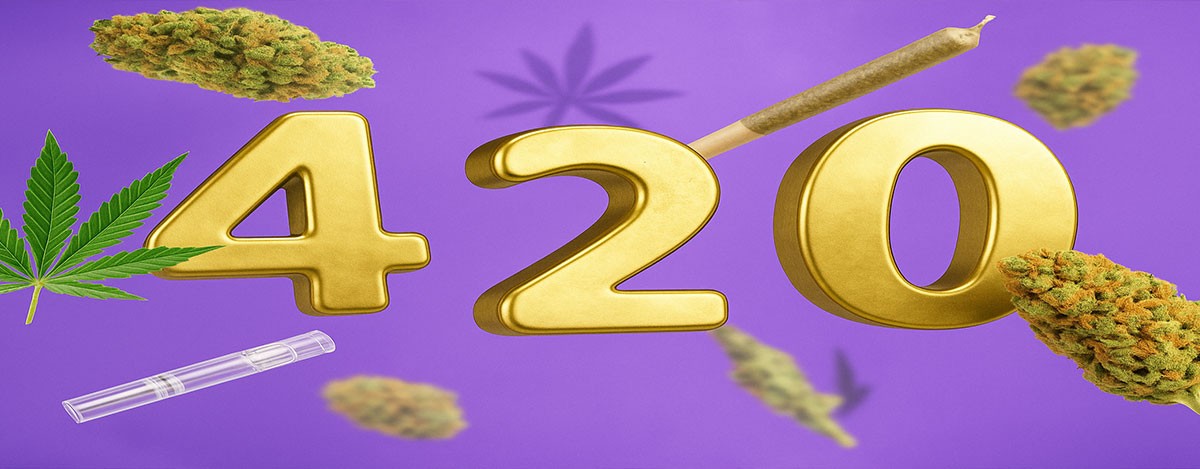Last Updated on April 23, 2025
Every April 20, millions of people around the world celebrate World Marijuana Day, an event that has gained popularity and relevance in recent years. But what is the origin of this peculiar celebration and why was that date chosen precisely?
April 20, or 4/20 in the date format commonly used in the United States, has become an iconic day for cannabis enthusiasts. The history behind this date has several theories, but one of the most accepted dates back to the 1970s in California, United States.
4/20 and The Waldos
According to legend, a group of teenagers from San Rafael High School, known as "The Waldos", used to meet at 4:20 p.m. after school to look for an abandoned marijuana growing field. They used the code "420" to coordinate their meetings and thus avoid being discovered by parents and authorities. Over time, the term "420" became popular among the cannabis consumer community as a discreet way of referring to marijuana and when consuming it.
A Less popular claim to 4/20
Another of the most accepted theories dates back to 1995 in Vancouver, Canada. There, 200 cannabis users gathered to demand the decriminalization of this product and, as a way of protest, smoked marijuana in public.
As cannabis culture expanded, April 20 became a symbolic date for gatherings, protests, events, and celebrations related to the plant. Today, World Marijuana Day is celebrated around the world with marches, festivals, conferences, and activities aimed at promoting cannabis legalization, education, and awareness.
Additionally, this day also serves as a platform to discuss important topics such as regulation, medical access, the social and economic impact of legalization, and consumer rights.
Despite the different opinions and positions surrounding cannabis, World Marijuana Day presents an opportunity to reflect on its history, use, and future, as well as to encourage open and constructive dialogue on this controversial topic in modern society.
Is it legal or not?
In recent years, laws in the United States regarding cannabis use have undergone significant changes, which could indicate a growing need for laws that regulate both recreational and therapeutic use.
Last November, the state of Ohio approved the recreational use of marijuana, becoming the 24th state to do so. This list continues to expand as the years go by. In this sense, the voting population of Florida has been called upon to express their opinion in November of this year regarding the recreational use of marijuana. These actions show an acceleration on the path to legalization, especially since California became the first state to legalize medical cannabis in 1996.
The states where recreational cannabis is legal are Ohio, Montana, Arizona, Massachusetts, Illinois, Maryland, Vermont, New Jersey, Washington, Connecticut, Missouri, Colorado, Maine, Oregon, New York, Nevada, California, Alaska, Delaware, New Mexico, Virginia, Rhode Island, Minnesota, and Michigan, according to data from CBS News. On the other hand, other countries legalized its consumption as well like, Spain, Portugal, Uruguay, Canada, and the Netherlands although restrictions are still imposed in the work environments open to hair drug testing
The legalization of marijuana, especially in the different territories of the United States, can often be ambiguous since there are many variations not only in taxes but in the regularizations as such. For example, in the case of Washington, D.C., where the sale of marijuana remains technically illegal, Congress legalized its possession. So, even though we are in a time of progress and action on the subject, there are still many gaps to fill.
How is it celebrated?
Well, with marijuana of course! However, some different venues and organizations hold special events for the occasion, where people can meet and enjoy themselves.
Denver's Mile High 420 Festival, for example, often draws thousands of people and is considered the largest free 4/20 event in the world.
Although Hippie Hill in San Francisco's Golden Gate Park has attracted large crowds, this year's gathering was canceled due to a lack of financial sponsorship and city budget cuts.
Some breweries produce 420-themed beers but without blends, such as Sweet Water Brewing in Atlanta, which hosted a 420-music festival, whose founders went to the University of Colorado. There are also substance stores that offer all kinds of discounts to their consumers.
The University of Colorado Boulder was historically one of the largest, although not so much since administrators banned the annual event more than ten years ago, as well as the university quads and state house gardens.
In collaboration with the term's potential coiners, Lagunitas Brewing in Petaluma, California, introduces its "Waldos' Special Ale" annually on April 20. Even on different occasions, members of Waldo have shown up to share with enthusiasts and taste the special beer.
April 20 has also become an important event for the industry, where suppliers come together to test other suppliers' products.
----------------------
Today, World Marijuana Day is celebrated in many places with festivals, demonstrations, and events that highlight the medicinal and recreational value of this plant. Although marijuana is still illegal in many places, the growing acceptance of its therapeutic use and its economic impact are leading many countries to reconsider their position.
It is important to note that, although the use of marijuana can have health benefits, it can also have risks for certain people, especially those with respiratory problems, pregnant women, and minors. As with any substance, it is important to use marijuana responsibly and always follow local laws and regulations.
On World Marijuana Day, it is important to reflect on the pros and cons of using this plant and how we can ensure it is used safely and responsibly. The public discussion about marijuana has evolved in recent decades and will continue to be an important issue for our society in the future.
Need to pass a hair follicle drug test?







